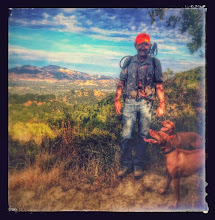"The Vizsla breed lays a strong claim to being one of the oldest documented sporting dogs in the world. The Magyar tribes which wandered the Russian Steppes and lived in the Carpathian basin during the eighth century, were known to hunt extensively when not breeding cattle. An anonymous scribe of Hungarian King Adelbert III (1235 - 1270) wrote about the history and wanderings of the Magyars, including their use of the yellow pointing dogs called the "Vizsla". Early illustrations of this dog appear in chronicles written by Carmelite Friars in 1357. 

Other Hungarian documented references to the Vizsla appear in the 1500's.
There is little doubt that the basic Vizsla was crossbred throughout the centuries with other breeds, including hounds. The Magyars apparently always took such crosses back to the basic Vizsla because hound noses are black and the true Vizsla nose is brown or flesh coloured. Even today, the resemblance of the Vizsla is closer to the lighter wild dogs of the Russian Steppes in colour and quality of coat.
There is little doubt that the basic Vizsla was crossbred throughout the centuries with other breeds, including hounds. The Magyars apparently always took such crosses back to the basic Vizsla because hound noses are black and the true Vizsla nose is brown or flesh coloured. Even today, the resemblance of the Vizsla is closer to the lighter wild dogs of the Russian Steppes in colour and quality of coat.

The Vizslas were companion dogs of the early warlords and barons and kings. Their blood was preserved pure for centuries by the land owning aristocracy and held in high esteem by their owners.
The Vizsla has survived the Turkish occupation, the Hungarian Civil Wars, World Wars I and II, and the Russian occupancy. Late in the 19th century, the Vizsla suffered a decline and during the Second World War, came close to becoming extinct. In 1945, when the Russian occupation forces invaded Hungary, many of the wealthy aristocrats were forced to flee their beloved land.
 Serveral were able to smuggle their Vizslas and pedigree records out of the country. These owners fled to various parts of Europe and North America with their dogs and from this small, remaining Vizsla stock are descended our present day dogs. Some of these Hungarians came to Canada and the United States in the early 1950's and brought their dogs with them."
Serveral were able to smuggle their Vizslas and pedigree records out of the country. These owners fled to various parts of Europe and North America with their dogs and from this small, remaining Vizsla stock are descended our present day dogs. Some of these Hungarians came to Canada and the United States in the early 1950's and brought their dogs with them."









No comments:
Post a Comment